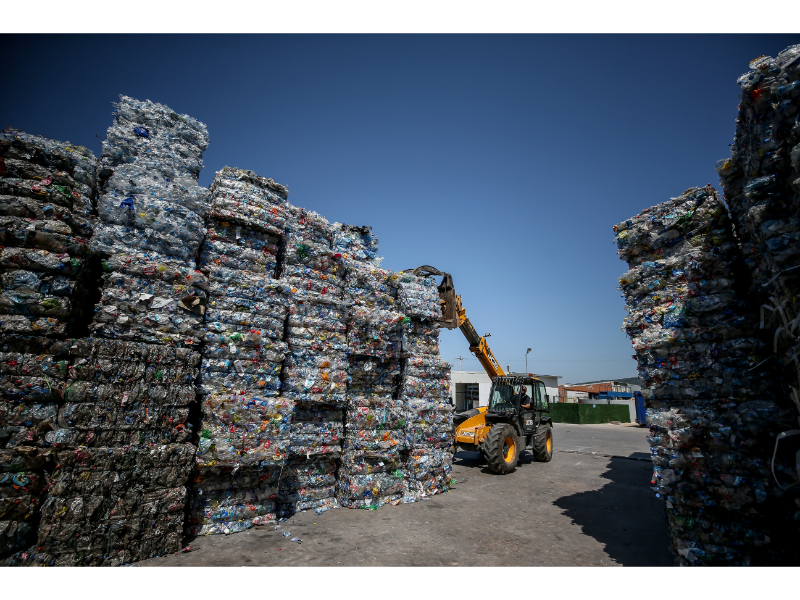Today, increasing population and changing consumption habits cause the rapid rise of waste. This situation poses serious risks for both the environment and human health. When plastic packaging, paper waste, glass bottles, and various industrial residues are left carelessly in nature, they lead to long-term environmental damage. At this point, the recycling factory plays a critical role in solving this problem.
The recycling factory is a center that separates and reprocesses waste. It also reintroduces these materials into the economy as raw materials. Thus, the protection of natural resources is ensured. Environmental pollution is also prevented. For example, recycling just 1 ton of paper prevents the cutting of about 17 trees. Recycling aluminum saves up to 90% energy compared to primary production. If there were no facilities like recycling plants, tons of waste would have to be left in nature or landfills.
In this article, we will discuss the importance of the recycling factory concept in detail. We will also cover its working system and its contributions to waste management. By giving examples especially from recycling factory in Bursa, we will explain which wastes are processed. We will also explain how plastic recycling plants work. Thus, we aim to raise awareness so that both individuals and businesses can contribute to environmentally friendly practices. The first step towards a sustainable future starts with proper waste management and effective recycling factory solutions.
Table of Contents
- What is a Recycling Factory?
- Bursa Recycling Factory
- Which Wastes are Processed in Recycling Factories?
- How Do Plastic Recycling Factories Work?
- How to Improve Waste Management with a Recycling Factory?
- Frequently Asked Questions (FAQ)
- Conclusion
What is a Recycling Factory?
A recycling factory is a specialized facility that reprocesses waste materials into raw materials. It sorts unused or waste products. Then it reintroduces them into production through various processes. We send the recyclable waste we collect at our homes and workplaces to these facilities. Because recycling plants turn this waste from trash into valuable resources. They contribute to the environment and the economy by converting them into reusable resources.
In a recycling factory, they carry out the waste management process systematically. First, they classify the waste according to its type. Then they separate each type into appropriate sections. After that, they apply specific recycling processes for each material type. They melt plastic waste and turn it into granules. They turn paper into pulp with water and chemicals.

Recycling facilities typically employ five key stages. The first stage is collection and sorting. Once waste arrives at the plant, staff or automated systems sort it. They separate it into types like plastic, metal, and paper. This stage is crucial for efficient recycling. The second stage is pre-processing and preparation. They perform necessary steps to prepare the waste for processing. If needed, they wash and clean these materials.
In the third stage, the processing phase, they use suitable conversion methods for each waste type. They transform plastic and metal waste by melting them at high temperatures. They also use chemical processes for separation. Paper waste is turned into pulp using water and chemicals. Organic waste is converted into energy or fertilizer.
The final stage is storage and shipment. In this stage, they package and store the obtained raw materials properly. Afterwards, they ship these materials to requesting factories or markets. This completes the recycling cycle. At every step, they recover resources without leaving waste in nature.
Bursa Recycling Factory
With over 25 years of experience, BURKASAN plays a leading role in waste management. This is not only across Turkey but also in Bursa and its vicinity. It contributes to the formation of an environmentally conscious industrial structure. They achieve this through integrated waste management solutions. These solutions are specifically developed for industrial organizations, production facilities, healthcare institutions, and various businesses in the region.
For businesses seeking a Bursa recycling plant, BURKASAN is more than just a service provider. It is also a reliable and long-term solution partner. The company develops strategic plans suitable for each business’s waste profile. It professionally executes all steps from the collection and sorting of recyclable waste. This includes temporary storage and final recycling processes.
BURKASAN’s expert staff works by focusing on compliance with regulations, environmental responsibility, and operational efficiency principles. The solutions it offers not only fulfill legal obligations. They also contribute to its customers achieving their environmental sustainability goals. Especially through the systems it has established in organized industrial zones and intensive production areas, waste is prevented from becoming garbage. Instead, it is transformed back into economic value.
Which Wastes are Processed in Recycling Factories?
Today, recycling plants play a critical role in building a sustainable future. They re-evaluate waste materials from various sources. This significantly contributes to the protection of natural resources. It also helps in the reduction of environmental pollution. The main types of waste processed in these facilities are quite diverse. For example, plastic waste comes in many different forms. These range from plastic bottles to packaging materials. Recycling factory process them with special treatments. This turns them into plastic granules. These granules are then used as raw materials in the production of new plastic products.
Paper and cardboard waste are collected from a wide range. This includes newspapers to cardboard boxes. They are turned into pulp with the help of water and chemicals in recycling facilities. Then, they are used in the production of new paper products. Glass waste, from glass bottles to jars, is separated according to its color. After that, it is melted at high temperatures and reshaped. Finally, it is offered for reuse.
Electronic wastes undergo a special recycling process. This is due to the valuable metals and reusable parts obtained from end-of-life devices. Organic wastes are evaluated using methods like composting or biogas production. This turns them into soil-enriching fertilizer or an energy source. Even other waste types exist. For example, wastes like wood and textiles can be reprocessed in recycling plants with appropriate technologies. Thus, they can become raw materials for different products. Thanks to all these processes, recycling plants make significant contributions. These contributions are in the areas of environmental sustainability and economic development. Recycling plants process many different types of waste produced by modern societies. By doing so, they turn waste from just a problem into a valuable resource.

How Do Plastic Recycling Factories Work?
Plastic recycling plants are specialized facilities. They reintroduce plastic waste for reuse to support environmental sustainability. They also aim to create economic value. In these plants, plastic wastes go through certain stages. This turns them back into raw materials. The process is carried out with both technological equipment and systems compliant with environmental regulations.
- Collection and Separation: The first step is the collection of plastic waste. This waste is sourced from homes, workplaces, industrial facilities, or municipal waste collection systems. Plastics arriving at the recycling plant are first separated according to their types. Different plastic types like PET, HDPE, PVC, and LDPE are specifically classified. This is because their processing methods and melting temperatures differ.
- Washing (Cleaning): The separated plastics undergo a detailed washing process. Substances like labels, dust, dirt, oil residues, and adhesives are cleaned. This is done with high-pressure water and sometimes with special cleaning chemicals. This stage is very important for the subsequent processes to proceed smoothly.
- Shredding (Crushing-Grinding): Clean plastics are fed into crushing machines. They are broken down into small pieces (flakes). This process increases the surface area of the plastic. This makes the melting process more efficient. The shredded plastics are then ready for the next stage.
- Melting and Filtration: The shredded plastics are directed to extruder machines according to their types. In these machines, the plastics are melted at high temperatures. The molten plastic pulp passes through filtration systems. This removes any remaining foreign substances.
- Granule Production (Transformation into Raw Material): The obtained plastic melt is extruded in long thin strips. It enters a cold water bath and hardens rapidly. These strips are then cut into small granules in granulator machines.
These granules can be used in the production of many products. Examples include plastic bottles, pipes, packaging, automotive parts, and textile fibers.
How to Improve Waste Management with a Recycling Factory?
Recycling plants are one of the most critical components of modern waste management. These facilities have an important function. They not only ensure the disposal of waste. They also allow it to be re-evaluated with economic and environmental gains. The process begins with sorting waste at its source and collecting it correctly. Then, this process takes on an organized structure in recycling plants. This organized structure offers great contributions in terms of sustainability.
The operation of a recycling plant improves waste management in the following aspects:
- Waste Turns into Economic Value: Waste that is likely to go to the trash is first separated. This separation is based on materials such as paper, plastic, glass, and metal. Then, this waste is recycled and converted into raw materials. In this way, both waste is prevented and dependence on natural resources used in production processes is reduced.
- The Burden of Landfills is Reduced: Thanks to recycling plants, recyclable waste is brought into the economy without being sent to landfills. This situation has some positive consequences. First, the waste collection and storage burden of municipalities decreases.
- Sectoral Awareness Increases: Recycling facilities exist. These facilities encourage industrial and commercial enterprises to adopt a more conscious waste management policy. Businesses must optimize their waste separation processes.
- Carbon Footprint Decreases: Recycling reduces the amount of energy used in production processes. For example, the production of recycled aluminum requires 95% less energy. This is compared to the production of aluminum from raw materials.
- Employment Opportunities Arise: Recycling plants offer job opportunities to many people. These opportunities arise in sorting, transportation, analysis, and production processes. At the same time, it opens new employment doors in specialized fields.

Frequently Asked Questions (FAQ)
What is the main purpose of a recycling factory?
The aim is to process various materials classified as waste and convert them back into raw materials. Thus, the depletion of natural resources is prevented. Energy saving is ensured, and environmental pollution is reduced.
What are the main processes applied in a recycling factory?
Generally, some basic processes are applied. These processes are collection, sorting, cleaning, and size reduction (grinding). For some materials, there is also a melting stage. Finally, with reshaping, wastes are converted into raw materials for new products.
Do recycling factory only process household waste?
No, recycling plants do not only process household waste. They can also process many different types of waste from industrial and commercial sources. Various materials such as plastic, paper, metal, glass, and electronic waste can be recycled in these facilities.
Which types of plastics are processed in plastic recycling factory?
There are different types of plastics such as PET (polyethylene terephthalate), HDPE (high-density polyethylene), PVC (polyvinyl chloride), LDPE (low-density polyethylene), PP (polypropylene), and PS (polystyrene). These plastics can be processed in recycling plants with appropriate technologies.
Conclusion
Environmental awareness and sustainable development goals are among the priorities of today’s world. Recycling factory play a key role in achieving these goals. The correct and effective processing of waste does not only contribute to the reduction of environmental pollution. It also provides a significant boost to the economy thanks to the valuable raw materials obtained from waste. In this context, recycling factory investments and operations are an indicator of environmental responsibility awareness. They are also strategic steps that hold the potential for long-term economic returns.
If you would like to explore more of our content on behalf of Burkasan, you can take a look at our other articles.

